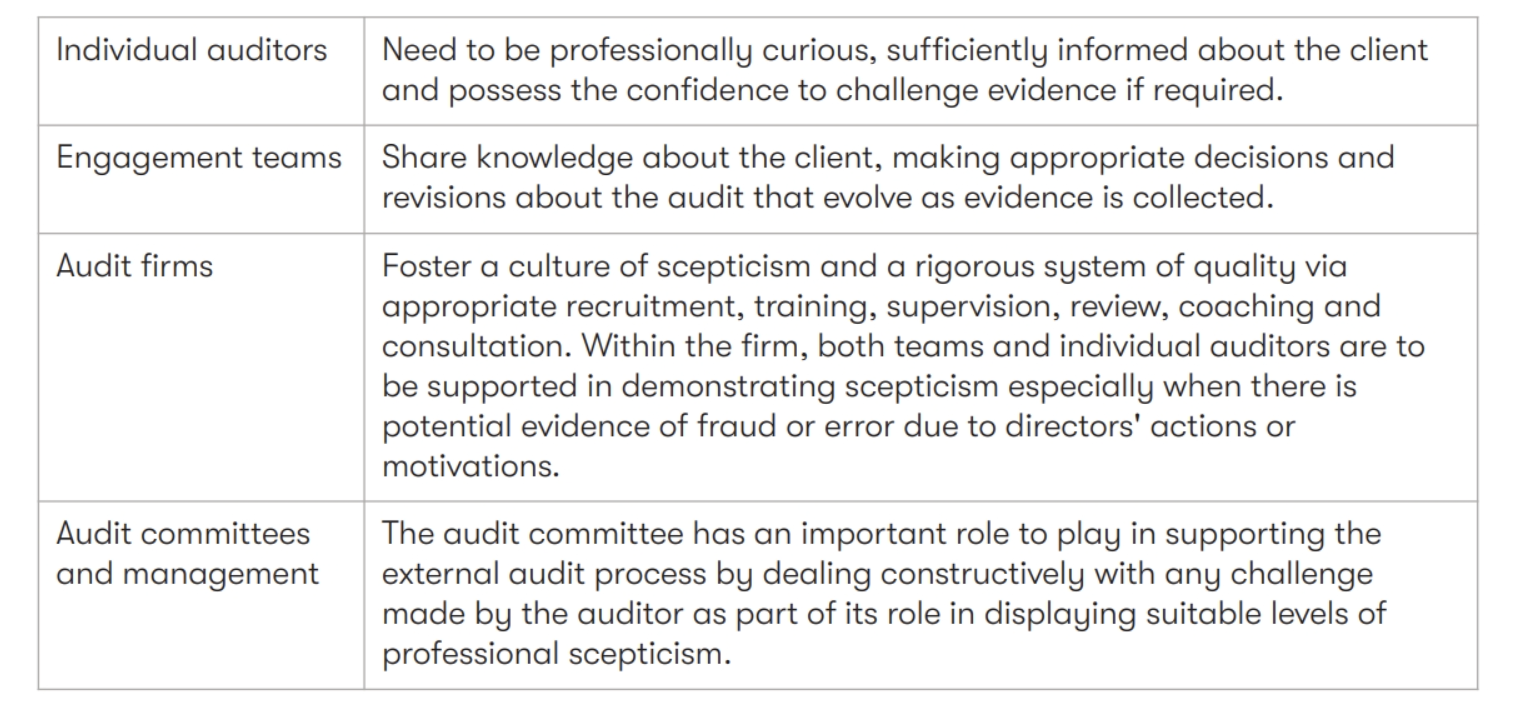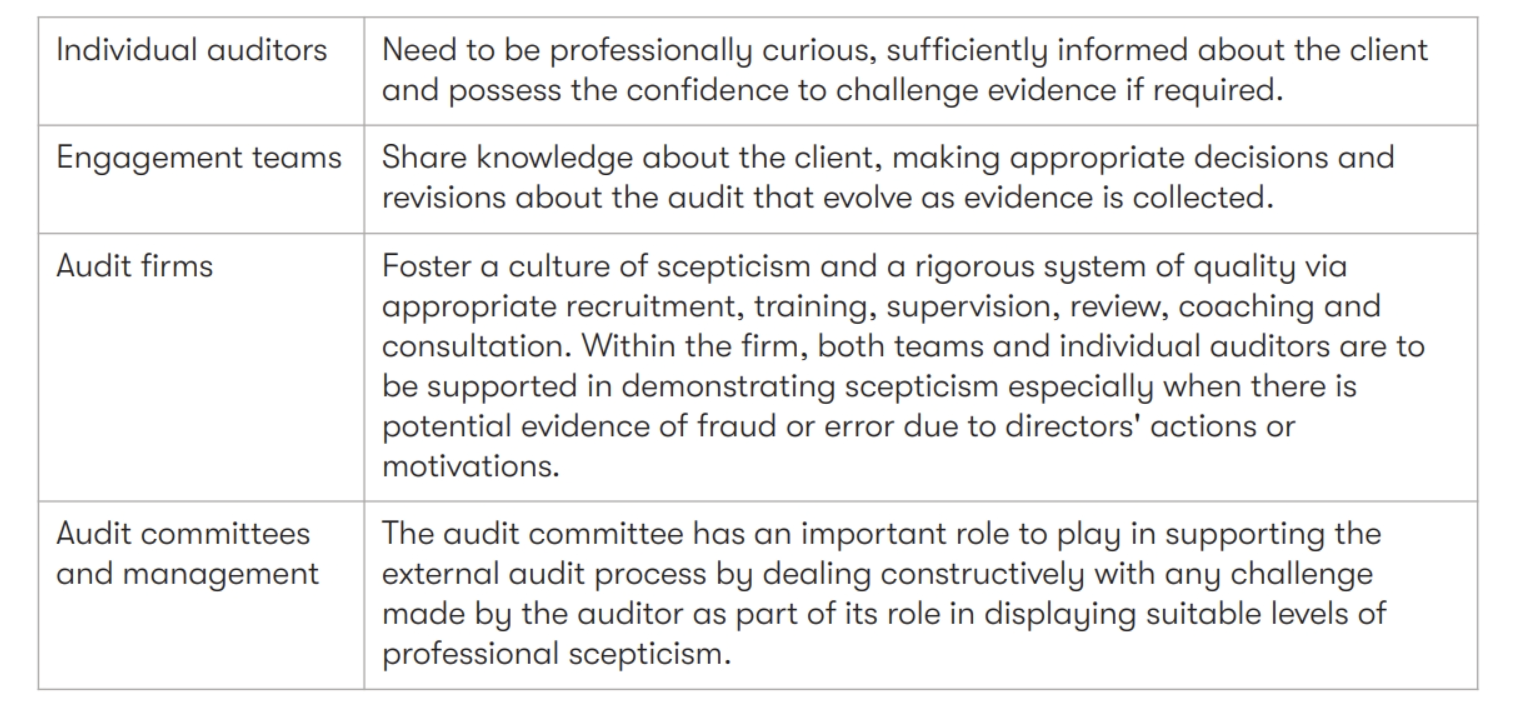4. planning audit risk
1/31
There's no tags or description
Looks like no tags are added yet.
Name | Mastery | Learn | Test | Matching | Spaced |
|---|
No study sessions yet.
32 Terms
audit risk
the risk that the auditor does not detect one or more of the risks that relate to an audit and gives an opinion that the financial statement are true and fair
risk u give the incorrect opinion
audit risk =
inherent risk x control risk x detection risk
inherent risk
such risk is always present in areas of the client that are susceptible to fraud
control risk
another risk only present in clients, representing the risk of controls not preventing or detecting fraud
inherent risk and control risk make up the ______
risk of material misstatement
detection risk
the risk that audit procedures will not detect a misstatement
sampling risk
risk the sample doesn’t adequately represent the population
non-sampling risk
poor interpretation of the sample by the auditor
auditor may lack experience
2 characteristics of risk assessment process
likelihood - how possible
impact - how significant


What do individual auditors need to demonstrate?
They need to be professionally curious, sufficiently informed about the client, and possess the confidence to challenge evidence if required.
What is the role of engagement teams in demonstrating professional scepticism?
They share knowledge about the client, make appropriate decisions, and revise the audit as evidence is collected.
What role do audit committees and management play in professional scepticism?
They support the external audit process by constructively dealing with challenges raised by auditors and demonstrating suitable levels of professional scepticism.
materiality
if the omission or misstatement could affect economic decision of the primary users of the financial statement
trade receivable has increased by 25% and revenue has increased by 7%
understated or overstated
overstated
trade payables has decreased by 5% and purchases has increase by 4%
understated or overstated
understated
materiality is important as it _____ the threshold above which further audit work becomes ____
determines
necessary
What is performance materiality?
It is the amount set by the auditor at less than materiality for the financial statements as a whole. It reduces the probability that the aggregate of uncorrected and undetected misstatements exceeds materiality for the financial statements.
Why is performance materiality used?
to address the risk that individually immaterial misstatements could aggregate and exceed materiality for the financial statements as a whole.
What happens if a lower materiality level is concluded during the audit?
The auditor must revise performance materiality and determine whether the nature, timing, and extent of further audit procedures remain appropriate.
What must be documented by the auditor regarding materiality?
Materiality for the financial statements as a whole
Materiality level(s) for particular classes of transactions, account balances, or disclosures (if applicable)
Performance materiality
Any revision of the above amounts during the audit
What are the three types of audit risk?
Inherent risk: Susceptibility of certain items to be misstated (client-driven).
Control risk: Failure of internal controls to deal with inherent risks (client-driven).
Detection risk: Risk that the auditor does not detect a misstatement, including sampling and non-sampling risk.
How can risk be assessed and expressed?
Graphically on a risk matrix and numerically by assigning a suitable grade.
What are analytical procedures used for?
To identify and understand risks within financial statements using techniques like ratios, comparisons, and benchmarks.
Why is materiality a difficult area for auditors?
It heavily relies on judgement, making it challenging to apply effectively.
_____ risk: risks arising as a result of the nature of the business, its transactions and environment
inherent
______ risk - the risk that the control system at the company does not detect, correct or prevent misstatement
control
_____ risk - risk the auditors don’t discover misstatements in the financial statements
detection
what can go wrong with balances, transactions and events at the fs level
items can be overstated or understated
items requiring disclosure can be omitted
materiality is the concept of importance to users
t/f
t
calculating materiality and selecting samples on the basis of materiality helps the auditor to reduce audit risk to an acceptable level
t/f
t
material and pervasive is taken to mean the misstatemnt is
_____ to one item in the financial statements
______ to one item, but the item could represent a substantial portion of the financial statements
if relating to disclosure, ____ to users understanding of the financial statements
not confined
confined
fundamental